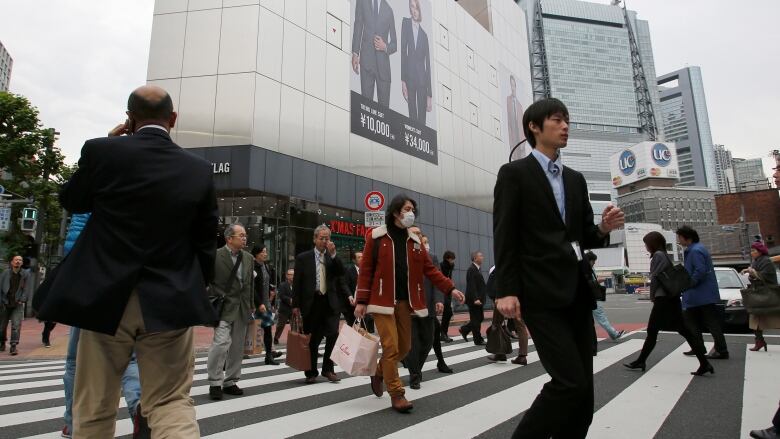Japanese economy slides back into recession
Housing investment drops sharply

Japan's economy unexpectedly slipped back into recession as housing and business investment dropped following a sales tax hike, hobbling its ability to help drive the global recovery.
The world's third-largest economy contracted at a 1.6 per cent annual pace in the July-September quarter, the government said Monday, confounding expectations that it would rebound after a big drop the quarter before.
The news cast a pall over financial markets: Japan's share benchmark fell 3 per cent, and many others in Asia also declined. Shares were lower in early trading in Europe and Dow Jones and S&P futures were off 0.5 per cent, suggesting a dismal start for the week on Wall Street.
An economy is generally considered to be in recession when it shrinks for two consecutive quarters.
Deepening uncertainty
"GDP for July-September wasn't good, unfortunately," Prime Minister Shinzo Abe told a political gathering in Tokyo shortly after his return to Japan from the Group of 20 leading economies in Brisbane, Australia.
The bleak showing likely means more of Abe's reforms are likely to be postponed if not cancelled outright. "Its likely we will hear shortly that the consumption tax hike will be postponed and that is a silver lining that markets should respond positively too," Scotiabank said in a note to clients.
The downturn deepens global uncertainty as growth slows in China and remains stubbornly flat in the 18-country eurozone.
Japan's weakness could hinder growth elsewhere if its companies cut investment and buy fewer imports such as machinery, electronics and raw materials. Though it is a small, island nation, Japan is one of the world's biggest importers of food and the third-biggest buyer of natural gas.
The U.S. economy, which grew at a 3.5 per cent pace last quarter, is outpacing most of the developed world.
Japan's gross domestic product data showed across-the-board weakness in demand among consumers and manufacturers, who had stepped up purchases before the sales tax was raised in April to 8 per cent from 5 per cent.
"The impact of the sales tax was much more severe than expected," said Junko Nishioka, an economist at RBS Japan Securities.
Housing investment plunged 24 per cent from the same quarter a year ago, while corporate capital investment sank 0.9 per cent. Consumer spending, which accounts for about two-thirds of the economy, edged up just 0.4 per cent.
Given the contraction, Abe is expected to announce Tuesday that he will delay a second sales tax hike to 10 per cent planned for next October. That would relieve pressure on the economy, but slow progress on efforts to rein in Japan's government debt, the largest among industrialized nations.
Abe is also likely to use the decision to delay the tax hike as a reason to call a snap election in mid-December to secure a public mandate for delaying progress on fixing Japan's finances. That choice may be puzzling to some, but the ruling Liberal Democrats have a solid majority and hope to consolidate their power further at a time when opposition parties are viewed as weak and in disarray.
Japan emerged from its last recession just as Abe took office in December 2012, saying he would end two decades of stagnation with a combination of lax monetary policy, strong fiscal spending and "drastic" economic reforms a strategy dubbed "Abenomics."
But consumer spending is faltering as the population shrinks and grows older. Japanese manufacturers have lost their leading edge in innovation while shifting production to cheaper locations offshore.












_(720p).jpg)


 OFFICIAL HD MUSIC VIDEO.jpg)
.jpg)



























































































